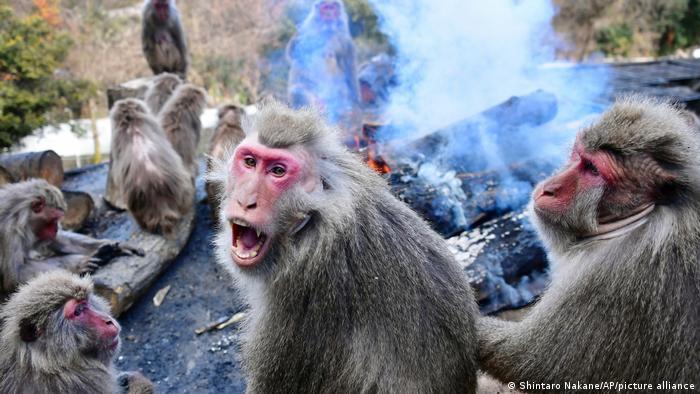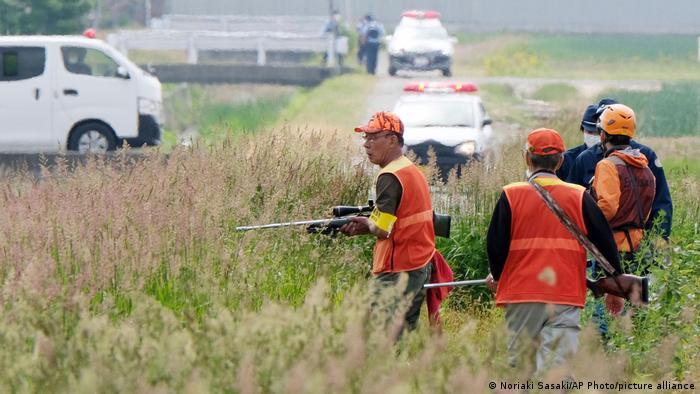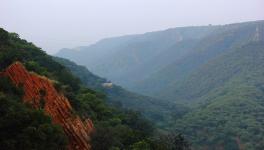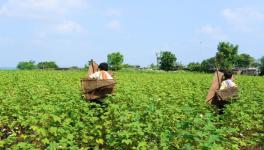Japan's Wildlife Turns On the Human Population

There has been a sharp increase in reports of attacks by monkeys this summer
Dramatic changes in the landscape of rural Japan have caused significant changes in the behavior of the nation's wild animals, leading to more frequent — and more violent — clashes with humans.
In years gone by, bear attacks have typically accounted for the majority of the attacks on humans, along with occasional rampages by boars. But there has been a sharp increase in reports of attacks by monkeys this summer, while authorities in one coastal city have warned of dolphins becoming aggressive toward swimmers.
And while such confrontations in the past primarily took place when humans strayed off the beaten path, with people foraging for mushrooms and other mountain vegetables attacked by bears, incidents are increasingly happening in the suburbs of some of the nation's biggest cities.
Brown bear shot dead
In June last year, hunters had to be called in to shoot a brown bear that injured four people in the suburbs of Sapporo, the largest city on the northern island of Hokkaido.
Authorities had to close the city's airport, shut down 42 schools and put a military base on lockdown before the 2-meter bear was shot.
In the six months to November 2020, a record 13,670 bears were sighted across Japan, with no fewer than 63 people mauled in attacks, two of whom died of their injuries.

In June last year, hunters had to be called in to shoot a brown bear that injured four people in Hokkaido prefecture
In southern Japan, residents of the tiny island of Kakara are considering evacuating as wild boars have largely taken over, destroying crops of pumpkins and sweet potatoes and becoming increasingly aggressive and territorial.
The situation has become so bad that parents no longer allow their children to play outdoors for fear they will be attacked.
This summer, Japanese media has devoted extensive coverage to a number of clashes between troops of monkeys and local people. In some cases, the rogue simians have entered people's homes by opening windows or breaking a mosquito screen, and have bitten or scratched residents.
Local authorities in Yamaguchi Prefecture, in southern Japan, reported 66 incidents in July alone and issued advice to local residents to not make eye contact with a monkey as it could be perceived as a challenge and precipitate an attack.
Authorities have set up traps and carried out patrols, with two particularly aggressive monkeys caught and euthanized.
"I think the statistics confirm that we are seeing far more cases in recent years than before," said Mariko Abe, of the Nature Conservation Society of Japan.
Impact of climate change
"There seem to be several factors contributing to the increase in these cases, but I think one of the biggest — particularly this year — is the effect of climate change," she told DW.
"For the last decade or so, the rainy season that used to reliably last for around a month from mid-June has become shorter and delivered less rain," she said. "And this year it has been extreme."
"There was cloud cover during June, but not enough rain and now we are seeing record high temperatures across the country."
The result is that the food sources in the mountains and forests have not produced sufficient quantities for the monkey population, meaning they have had to go looking for sustenance. And that has brought them into areas of human habitation.
Another factor is that suburbs are constantly edging further into animals' habitats, she added.
Kevin Short, a professor who specializes in environmental education at the Tokyo University of Information Sciences, agrees that the loss of habitat is a major reason for increasing numbers of wild animal intrusions into urban areas.
He also pointed out that due to Japan's shrinking rural populations, there are fewer hunters to cull wildlife, resulting in an explosion in the number of bears, boars and monkeys in recent years.
"In the past, these villages used to work as a sort of buffer zone between the forests and the suburbs and villagers would cull the animals that took their crops and so on," he said.
"With villages losing all their young people and gradually shrinking, there are fewer people to stop the wildlife from taking over.
'Not frightened of humans'
"I also feel that means animals are often no longer frightened of humans," Short said.
"Japanese macaques, for example, are very intelligent and once they realize that they do not need to fear humans and that they can effectively bully us, then that spreads through the troop very quickly.
"They have also learned that the suburbs of Japan's towns and cities provide attractive and easy sources of food," he said.
And while people have had more run-ins with bears, boars and monkeys in recent years, reports of dolphins biting swimmers off the central city of Fukui have come as a surprise to many Japanese.
The local authority has introduced beach patrols and buoys that emit ultrasonic sound waves to keep dolphins away from beaches, and posted signs warning people not to approach the creatures.
"The bottom line is that these are wild animals in their natural habitat," said Abe. "Humans are intruding into their spaces, they are not pets and people cannot just play with them. People need to learn to stay away from wildlife."
Edited by: Srinivas Mazumdaru
Get the latest reports & analysis with people's perspective on Protests, movements & deep analytical videos, discussions of the current affairs in your Telegram app. Subscribe to NewsClick's Telegram channel & get Real-Time updates on stories, as they get published on our website.
























